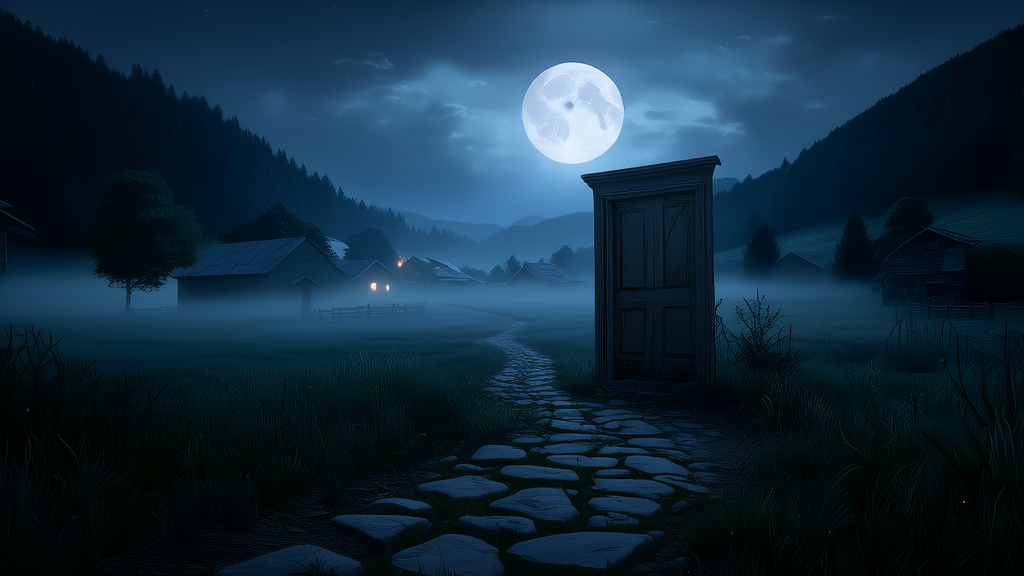🔮 Weird Tales & Urban Legends
The Forgotten Shop Between Two Hills and the Moonlit Path Elara Could Not Escape

In a quiet town nestled between two fog-draped hills, there was an old antique shop that no one seemed to remember ever being there. The locals spoke of it in hushed tones, as if the mere mention might summon something unseen. It had no sign, no name, just a creaking wooden door that opened only when the moon was full. Those who entered rarely returned, and those who did were never quite the same.
One evening, a young woman named Elara found herself wandering through the town’s outskirts, drawn by a strange pull she couldn’t explain. She had heard whispers of the shop from an elderly neighbor, but had dismissed them as superstition—until she saw the door. It stood alone, half-hidden behind a tangle of ivy, its frame warped with age. A faint glow seeped from inside, like candlelight flickering behind a dusty window.
Curiosity overpowered her fear. She pushed the door open, and the air inside was thick with the scent of aged wood and old paper. Shelves lined the walls, each filled with trinkets that seemed to hum with a quiet energy. A clock ticked backward. A mirror reflected not the room, but a shadowy forest. A teacup sat on a table, its handle missing, yet still warm to the touch.
An old man emerged from the shadows, his eyes glinting like polished obsidian. “You’ve come for the cursed objects,” he said, his voice low and resonant. “But beware, they do not give freely.”
Elara asked what made them cursed. He smiled, revealing teeth that looked too white. “They are not cursed by themselves. They are cursed by the stories people tell about them. Each object holds a memory, a whisper, a fragment of a life once lived.”
He led her deeper into the shop, where a small cabinet caught her eye. Inside lay a locket, its silver tarnished, its chain broken. “This belonged to a woman who died waiting for a lover who never returned,” he whispered. “She never stopped believing he would come back, even after the years turned to dust.”
Elara reached out, and the moment her fingers brushed the metal, a cold shiver ran up her spine. She saw a vision—a woman standing at a train station, her breath visible in the winter air, her eyes fixed on the distant tracks. The train never came. The woman never left.
“Why show me this?” she asked, pulling her hand back.
“Because you are listening,” the old man replied. “And that is dangerous.”
As she continued through the shop, more objects called to her. A compass that always pointed west, though the town was far east. A book with pages that changed as she read, telling different stories depending on her mood. A music box that played a lullaby only she could hear, its melody both comforting and sorrowful.
Each item held a story, and each story carried a weight. Elara began to feel the presence of the past pressing against her, as if the shop itself was alive, watching, waiting.
At last, the old man placed a small, unassuming key on the counter. “This belongs to the final room,” he said. “It is not meant for everyone. Are you ready?”
She hesitated, then nodded. The key felt warm in her palm, as if it had been waiting for her.
The door to the final room was locked, but the key fit perfectly. Inside, the air was colder, and the walls pulsed faintly, like a heartbeat. In the center of the room stood a single object: a blackened mirror, its surface cracked and uneven.
The old man’s voice echoed from somewhere behind her. “This mirror shows not your reflection, but your future. But be warned—once you see it, you may never return to the world you knew.”
Elara stepped closer, her breath shallow. The mirror rippled, and for a moment, she saw herself—older, weary, standing before the same shop, her eyes hollow. She turned, and the door was gone. The walls closed in. The silence pressed against her, thick and heavy.
When she finally stepped back, the mirror was empty again. The old man was gone. The shop was gone. And she stood alone in the fog, the key now cold and useless in her hand.
She never spoke of what she saw. But sometimes, when the wind blew just right, she swore she could hear the echo of a lullaby, and feel the weight of a thousand forgotten stories pressing in from the edges of her mind.
Published on en
🔗
Related Sites
- AI Blog — AI trends and tech news